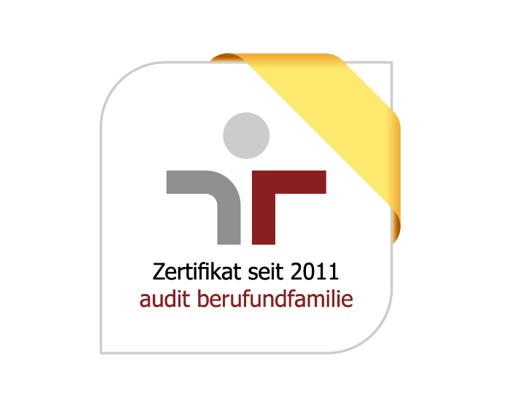HZB re-certified as a compatibility-friendly company again

The new audit logo for long-time certified companies © berufundfamilie Service GmbH
HZB has been certified as a family-friendly employer since 2011. Now the research centre has successfully completed the re-auditing process and developed further measures to promote a life phase conscious working culture. The certificate is considered a seal of quality for the company's compatibility policy and is awarded by the board of trustees of berufundfamilie Service GmbH.
In autumn 2020, HZB conducted an employee survey which showed that most employees are aware of and appreciate the numerous options HZB offers: flexible working hours, mobile working, part-time models, advice and practical help for employees with care responsibilities or small children.
At the same time, the survey made it clear that the needs of many employees in terms of compatibility have increased - not only, but also because of Corona. The need for support, especially for people with family responsibilities, has increased in the past year. Anja Seehrich, who heads the Office for Work and Life (OWL) at HZB, has also noticed this in her consultations. "Most are glad to work at HZB because they can count on a lot of understanding and practical support here."
Over the next three years, HZB will establish further measures that employees and managers worked out together. These include, among other things, reviewing the existing rules on home office, management guidelines and raising awareness of mental and physical diseases.
Jennifer Schevardo
https://www.helmholtz-berlin.de/pubbin/news_seite?nid=22642;sprache=en
- Copy link
-
Bright prospects for tin perovskite solar cells
Perovskite solar cells are widely regarded as the next generation photovoltaic technology. However, they are not yet stable enough in the long term for widespread commercial use. One reason for this is migrating ions, which cause degradation of the semiconducting material over time. A team from HZB and the University of Potsdam has now investigated the ion density in four different, widely used perovskite compounds and discovered significant differences. Tin perovskite semiconductors produced with an alternative solvent had a particular low ion density — only one tenth that of lead perovskite semiconductors. This suggests that tin-based perovskites could be used to make solar cells that are not only really environmentally friendly but also very stable.
-
Peat as a sustainable precursor for fuel cell catalyst materials
Iron-nitrogen-carbon catalysts have the potential to replace the more expensive platinum catalysts currently used in fuel cells. This is shown by a study conducted by researchers from the Helmholtz-Zentrum Berlin (HZB), Physikalisch-Technische Bundesanstalt (PTB) and universities in Tartu and Tallinn, Estonia. At BESSY II, the team observed the formation of complex microstructures within various samples. They then analysed which structural parameters were particularly important for fostering the preferred electrochemical reactions. The raw material for such catalysts is well decomposed peat.
-
Susanne Nies appointed to EU advisory group on Green Deal
Dr. Susanne Nies heads the Green Deal Ukraina project at HZB, which aims to support the development of a sustainable energy system in Ukraine. The energy expert has now also been appointed to the European Commission's scientific advisory group to comment on regulatory burdens in connection with the net-zero target (DG GROW).
